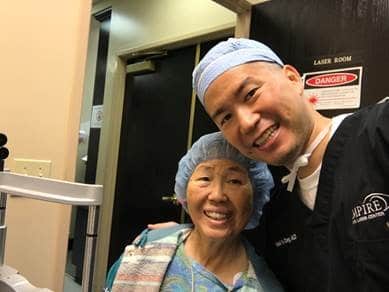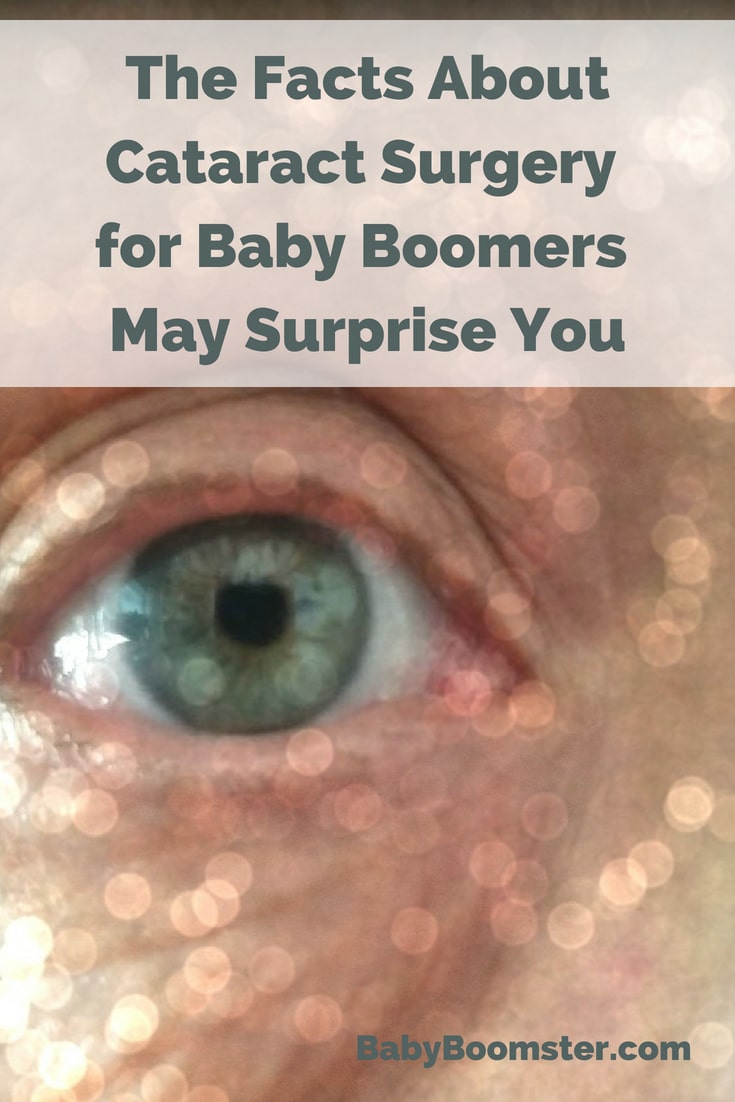I’m updating this post from 2018 because I had cataract surgery on both my eyes. It was no fun walking around or trying to drive with a fog sitting on your eyeballs. The most miraculous thing that happened is that my ophthalmologist fixed my very near-sighted vision to 20-20. I wore glasses from the time I was six years old and contacts since I was 14. I’m so excited to see clearly without them except for reading glasses.
Many people do not realize that this is a possibility once cataracts begin to appear. If you are over 65, cataract surgery is considered to be a medical condition that Medicare pays for.
I was awake during the surgery and could see what was going on. An anesthesiologist was standing by and I did ask for a tiny bit of sedative for the 2nd eye, but only to relax as the procedure doesn’t hurt. They numbed my eyes so I couldn’t feel anything.
I had a “dropless surgery” meaning I didn’t have to use eyedrops afterward. My sister had the procedure a year before me and had to use drops for quite a while. My surgeon injected the medicine into my eyes during surgery so I didn’t need them. I’m also glad we did both eyes at once during the pandemic because it eliminated another surgery prep and procedure. I recommend it.
Before my cataract surgery, I was afraid I would be blind for a couple of days, but that didn’t happen. I could see fine almost right away. My eyes were teary and stung a little from the numbing drops but the next day they were back to normal. I had a follow-up appointment the next morning and had my friend drive me just in case.
I was told to wear eye shields to bed that I taped on my face to prevent me from touching my eyes while I slept. They looked pretty weird but I was fine.
Interview with Dr. Daniel H. Chang M.D.
Dr. Chang is a Cataract and Refractive Surgeon; and Vision Correction Specialist. He is a board-certified ophthalmologist who received his medical and ophthalmology training from both Duke and Emory Universities and graduated with honors. He is also the only surgeon in the country invited to the most prestigious cornea and refractive surgery fellowship at Minnesota Eye Consultants. Talk about credentials!
Performing cataract surgery on his own mother
Dr. Chang’s parents were at the age where their vision was getting worse, and both were starting to develop cataracts. He knew at some point they would need to have surgery. His mom was having difficulty seeing clearly but she assumed it was time to get a new eyeglass prescription. Dr. Chang examined her and let her know that she needed cataract surgery because new glasses could only do so much.
How cataracts progress
Most people assume, as his mother did, that all they need are new glasses or contacts. However, once you’re in your 50’s and 60’s your vision problems may be more complicated. Cataracts are sort of like gray hair. At first, you only notice a couple of strands, but eventually, your whole head turns gray.
With cataracts, the lens in your eye begins to cloud and it progresses differently for every individual. It’s not uncommon to need surgery in your 50s but if you’re younger, your eye doctor may look for other solutions first.
What you need to look for
The need for cataract surgery is driven by your symptoms. If your eyesight is getting worse, you notice a glare at night when headlights flash into your eyes, or can’t see the fine print on a TV, you may have cataract symptoms. They will begin to change the way you live. You may find yourself avoiding night driving.
Most of Dr. Chang’s patients come to him through an optometrist and he has 3 criteria for doing the surgery:
- You must have cataract symptoms. (clouded or blurry vision, sensitivity to light, halos, fading or yellowing of colors, double vision)
- Your eye doctor must find a physical disability that can be documented. He or she may simulate the glare from headlights coming at you while you are being examined.
- There must be physical evidence of cataracts. Your eye doctor will see that your natural lens is foggy.
Dr. Chang’s primary goal is that his patients are happy after the surgery is done.
Will your insurance cover the procedure?
To qualify for insurance coverage to get cataract surgery your carrier will also look for the criteria mentioned above. Medicare and most private insurance will usually cover it, especially if you are in your 60s or 70s. Make sure to check your plan.
The surgery is not as bad as you think
Patients are usually surprised at how easy it is. Dr. Chang gives his patients the option of twilight sleep/sedation with an IV. He will also use a local numbing medicine on the eye. The entire procedure takes less than 20 minutes and he does one eye at a time. The other eye will be done within 1-4 weeks.
Your eye doctor will want to make sure there isn’t an infection, and this will provide time to tailor your other eye to your needs. You may experience a little scratchiness and discomfort the next day. Dr. Chang has done over 10,000 cataract surgeries and has never had anyone lose an eye.
Cataract surgery allows your eye doctor to tune up your vision
One thing that I didn’t know was that your ophthalmologist can improve your vision or even completely correct it during cataract surgery. I never had Lasik so that’s good news for me!
Your natural lens gets hazy as you age and is like having a dirty lens in your eye. During surgery, it is removed and replaced by a lens that can correct the length and curvature of your eye, similar to Lasik. It’s actually better to have cataract surgery when you are older rather than Lasik because the lens implant will not only correct your vision but help you see clearer.
Why do we end up needing reading glasses as we age
Once you reach your 40s your natural lens starts to get stiff and doesn’t auto-focus from a distance as easily as it did when you were younger. When that happens you usually wind up needing reading glasses.
Lasik will correct your vision but can’t adjust your zooming ability or get rid of nighttime glare like cataract surgery does. Once your natural lens is replaced, there are technologies that will give you an extended range of good-quality vision.
Dr. Chang used a TECNIS® Symfony lens on his mother by Johnson and Johnson Vision. It provides a continuous range of vision from intermediate to near and was FDA-approved a couple of years ago. It is the first in a new class of lenses that are designed to give patients a continuous range of vision and can even fix astigmatism and presbyopia. Many patients, following cataract surgery and insertion of these lenses, can now have 20/20 vision, after needing glasses or contacts for most of their lives.
How cataract surgery has changed
It used to be that a lens implant was put into a patient’s eye, but patients still needed bifocals or reading glasses. Because of advances in technology, such as the TECNIS® Symfony lens eye doctors can now correct vision for a range. Once you have the surgery, your vision can be improved, and you may no longer need glasses or contacts. Some patients only end up wearing sunglasses. You will also notice that the colors you see will be more intense and vibrant. The sky will be bluer, the grass greener, etc.
Other benefits of cataract surgery
It will significantly reduce your risk of falling. It’s easy to miss a step or the curb if you don’t see clearly. What many people do not realize is that bifocals increase your risk of falling and it only takes one fall to cause a tragedy when you’re older.
27,000 people over the age of 65 die from falls each year. The death rate from breast or prostate cancer is about 25,000 people per year. Cataract surgery will reduce your fall risk by 1/3. Bifocals increase your fall risk by 2.3-fold. These facts aren’t often mentioned to the public or even in the ophthalmology field so it’s important for Baby Boomers to know.
The fear of surgery may cause you to postpone it
Most people avoid cataract surgery because they are afraid to have the surgery and put it off. Dr. Chang had to convince his own mom she would be better off afterward. But the risk of falling or getting into a car accident because of poor vision is a much worse outcome. Decreased vision is dangerous so don’t wait and have the surgery if you need it. Make taking care of your eyes a priority.
Finding out that my vision can be improved after the surgery is done is making me excited to have it. What about you? Please leave a comment below.






I had both eyes done last year…can see so much better now! And it doesn’t hurt a bit! I only had a local in the eyes…
That’s so good to know Renee. How encouraging. This is information every person over 50 needs to know.
I had cataracts that began in the center of the eye and progressed quickly. I couldn’t even read stop signs! The surgery is as you describe. Simple and with improved vision. The color intensity was so great that I almost fainted!
Unfortunately, with the second eye, an astigmatism was created. I could see great with each eye, however I saw two of everything. Glasses corrected that. And they hide many wrinkles. I got transition lens, so I never hunt for my sunglasses.
Thanks for sharing your experience with the surgery, Adela. That’s so cool about the color intensity. I know perfect vision isn’t guaranteed for everyone. In most cases, it’s a big improvement.
Excellent advice. We need to take care of our eyes and be proactive.
So true, Elaine. The fact that improved vision and not having to wear bifocals can prevent falls was an eye-opener for me.
Renee, thank you for the information as I’m looking into different types of lenses for my left eye. Will be having surgery soon. Pat K.
Good luck with it.
Wow Rebecca! Thanks for all of this GREAT information! I’m not ready for my cataract surgery yet. I just got checked. But when I am I’m armed with some great info!
It’s something to think about in the future, Laura. Me too!
My husband is almost 80. He had cataract surgery on one eye which was the worst one. He got good results but then had better vision than the other eye. The doctor convinced him to have the other eye done. Since the second surgery he has double vision when turning to the side.
Hi Pam,
I’m so sorry that happened. It depends on the individual and doctor. I had both eyes done at the same time and my vision has been great. I’m due for a little laser clean up which only takes 10 minutes in the doctor’s office but so glad I had the procedure done especially after being nearsighted since I was 6. I hope your husband can get his eyes adjusted.